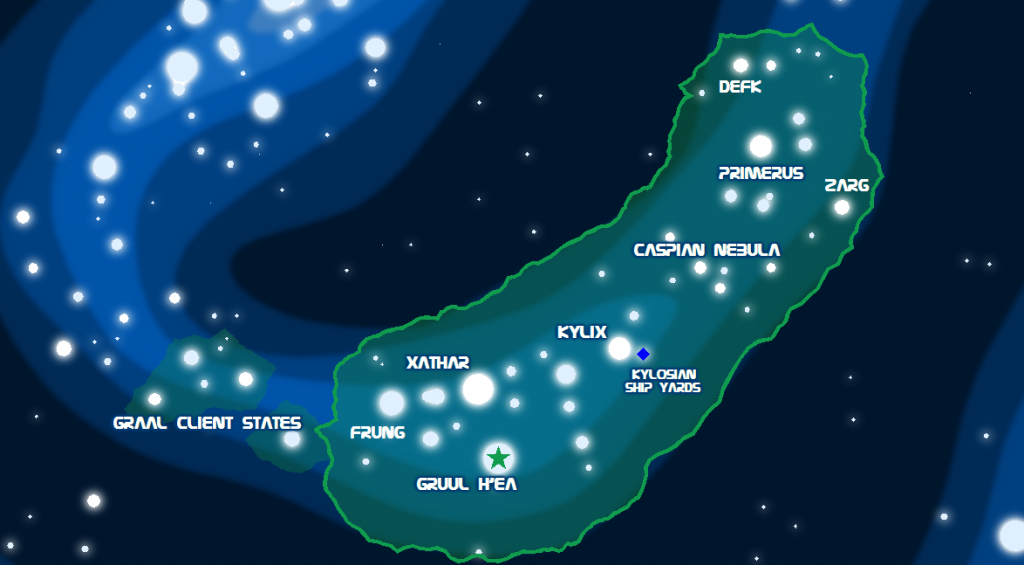Official Name: Yaren Axis (sometimes referred to as ‘the Yul System States’)
Unofficial Name(s): N/A
Demonym: Yul
Capital System/Planet: Yuku-Yaren
Home Region: N/A
Head of State:
Head of Government:
Head of Military:
Population: N/A
Type of Power: N/A
Race description: The yul—also known as yukanians—are a sentient species of fierce yet petite bipedal humanoids that have a strong facial resemblance to that of an Earth-native cave bat and a city-dwelling rat. They hail from Yuku-Yaren, a world slightly more massive than Earth that is known for its desert surface and its high levels of radiation.

Average weight: 45lb (if present on Earth)
Average height: 3’9
Average age of death: 25
Fur colors: Brown, grey, white and tan.
Eye colors:Blue, red and black.
MetabolismYul do not live very long compared to other races. Low life expectancy is owed to the yul's robust metabolism, which is what gives their bodies the power to move about so quickly, though it also causes them to perceive time at a much faster rate than the other species of the galaxy. To the average yukanian (especially those that lack a formal education), most intelligent species are slow, dull and dimwitted, as their movements are perceived as sluggish and restrained for seemingly no good reason.at all. Their warped perception of time is perhaps the main reason why the yul are so difficult to apprehend or hit during a prolonged chase or a melee, as their minds and bodies can react faster than those of their enemies.
Sensing vibrations and changes in air flow/directionYul can sense vibration within the ground using the paws of their feet, which made them exceptionally difficult to sneak up on during their race's early days on Yuku-Yaren. This physical feature is still present to this day, though the movement of millions of yukanian bodies and the clunking of vast subterranean networks of machinery makes the usability of this trait questionable at best and downright impossible at worse.
Using their whiskers, yul lay claim to an elevated sense of environmental direction, as the flow and direction of breezes and wind currents tells them where objects--like buildings, rocks or chairs--are stationed at. When moving about at high or low speeds, this talent unconsciously comes into play to great effect, enabling a yukanian to expertly navigate their surroundings.
Resistance to radiationYuku-Yaren is a radioactive wasteland that experiences a continuous flow of unusually high (and exceptionally deadly) radiation levels that make life on its surface unreasonably cruel and harsh. Its sickly state is principally owed to the rather weedy condition of its electromagnetic field and the immediacy of Yuku-Yaren to its adolescent parent star, Kul-Eh.
Regardless, the yul have long since adapted to their homeworld’s inhospitable conditions, with their species possessing the capacity to endure roughly 1,000 Greys worth of radiation before the yukanian form begins to yield to the devastating effects of radiation sickness. Much of this radioresistance is indebted to the sheer sophisticated workings of the yul immune system, which has evolved to undergo a biomechanically-induced form of immunotherapy that allows it to dynamically study, adapt to and finally destroy invading bacteria, viruses and cancerous cells with alarming efficiency and speed.
When sufficiently high levels of environmental radioactivity are detected, hormones are hurriedly dispatched throughout the confines of the body, resulting in the halting of cellular mitosis and cell production, while multi-domain matrix glycoproteins are prevented from binding to their specific cell surface receptors. This forestalls the conception of neoplasms and other anomalous growths, and makes yukanian cells virtually immune to the deliberating effects of radiation.
Agility, speed, regeneration and jumping abilityDuring the early periods of their race, the yul found themselves quickly forced into a ‘prey species’ role, which saw them regularly attacked by larger, stronger and faster animals that viewed them as an easy meal.
Initially, the yul defied aggressors by using their own innate cunning and their unique aptitude for regeneration (which enabled them to sacrifice an arm or a leg in order to preserve the greater ‘mass' in the event that a beast managed to get a firm grasp on its yukanian victim).
However, when it proved that mere smarts and the use of stem cells were not a substitute for a hardened physiology, the yul slowly underwent changes to their cardiovascular, skeletal and muscular systems that gifted them with fantastic speed, hypermobility and unparalleled nimbleness. The average yukanian can sprint at a speed of just over forty-five miles per hour—a clear result of the dense bundle of potent and tightly-woven muscle fibers and the generous length of the Achilles tendon in the yukanian leg—which allowed them to outpace and outmaneuver the larger beasts of Yuku-Yaren with astounding results.
Although sizable numbers of the the yul species still felt death's unrelenting embrace by the hands of their larger adversaries, their species saw substantial improvement in its overall population count, with the advent of underground farms, advancements in early subterranean digging technology and increased unification among the multitude of yukanian tribes further bolstering their total numbers.
Over time, the greater majority of the yul species migrated to Yuku-Yaren’s mountains regions, which provided hiding places (such as small crevices and caves) that could be used to deter the malicious intentions of the Wasteland World's voracious carnivores and the savage flesh-searing punishment that the daylight brought periodic basis.
The ledges and peeks of the area--which were easily navigated using powerful jumps, leaps and hops--gave the yul useful defensible positions from which they could employ ranged weaponry to drive away, kill or hunt prowling predatory creatures from. In some cases, early obsidian weapons were used to horrifying effect by swarms of yul warriors, who fell upon the backs of a titanic monster to slash and cut their way deep into its flesh.
Eyesight and neck mobilityYul eyesight is rated for performing well at night, as the extreme heat of Yuku-Yaren eventually forced many of its creatures to flee the tyranny of the day when foraging or hunting needed to be done. The eyes of a yukanian are large and situated near the sides of the head, giving them an increased field of vision, while the yul neck allows the head to rotate 180 degrees (which was a trait developed so as to allow the yukanians to spot predators).
Use of Yuku-Yaren's magnetic field This isn't so much a unique trait as it is an ability that nearly all of Yuku-Yaren's creatures have. It is no different than what the dogs, Australian Aboriginals, cats, or birds of Earth use to expertly navigate their own environments with. The yul do not have words that designate simple directions such as 'right' or 'left', but instead use words such as 'north', 'south', 'east', and 'west' when describing direction for all circumstances and things.
Language Communication between two yul is performed using a series of complex subsonic noises and spoken words that are combined with a dash of simplistic body language which comprises hand, head, shoulder, leg, and tail motions. Unlike most other races, yul are capable of exchanging a frightening amount of information in a short amount of time using varied pitches, tones and sound wavelengths.
DietYul are omnivorous creatures, but prefer vegetables and fruit as opposed to meat. While not related to their diet exactly, the yul do try to retain as much water as possible on account of Yuku-Yaren's desert-like landscape, which results in their feces having a rather dry composition.
History: (Self-Explanatory. Be as detailed as you desire -- just don't make it short as heck.)





